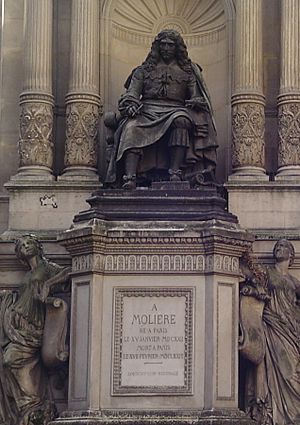The Learned Ladies facts for kids
The Learned Ladies (French: Les Femmes savantes) is a famous five-act play written by the French playwright Molière. It was first performed on March 11, 1672, at the Théâtre du Palais-Royal in Paris. This play is a satire, which means it uses humor, irony, or exaggeration to criticize people's foolishness or vices. In this play, Molière makes fun of certain ideas about women's education and intellectual snobbery in his time. It is written entirely in verse, which is like poetry.
Contents
What is The Learned Ladies About?
The Learned Ladies tells the story of two families and their different views on education and marriage. The main characters are Philaminte, Armande, and Bélise, who are three women in one family. They believe they are very smart and love to show off their knowledge. They spend their time studying philosophy, poetry, and science, often using big, complicated words.
The Characters and Their Ideas
Philaminte is the mother, and she is very proud of her learning. She wants her daughters to be just as "learned" as she is. Armande, one of her daughters, also thinks that studying is the most important thing. She believes women should focus on their minds, not on marriage or everyday life. Bélise is Philaminte's sister, and she is also very enthusiastic about intellectual pursuits, though sometimes she misunderstands things.
On the other hand, there's Henriette, Philaminte's other daughter. Henriette is sensible and kind. She wants to marry Clitandre, a young man she loves. However, Philaminte and Armande think Clitandre is not intellectual enough for their family. They want Henriette to marry Trissotin, a poet they admire, even though he is actually quite foolish and only pretends to be smart.
The Conflict in the Play
The play's humor comes from the clash between these two ways of thinking. Molière shows how the "learned ladies" are so focused on their studies that they sometimes forget about common sense and real-life problems. They care more about fancy words and showing off their intelligence than about true feelings or practical matters.
Why Molière Wrote This Play
Molière wrote The Learned Ladies to make people think about how they valued education. During his time, there was a growing interest in women's education, but also some people who took it to extremes. Molière wasn't against women learning; he was making fun of those who used their learning to be arrogant, impractical, or to look down on others. He believed that true wisdom included common sense and kindness, not just knowing many facts or using complex language.
Molière's Style of Satire
Molière was known for his comedies that often poked fun at different parts of society. In The Learned Ladies, he uses humor to highlight:
- Pretense: People who pretend to be smarter than they are.
- Snobbery: Looking down on others because they don't share your interests or knowledge.
- Extremes: Taking a good idea, like education, to an unhealthy extreme.
He wanted his audience to laugh at these behaviors, but also to learn from them. His plays often encouraged balance and moderation in life.
Impact and Legacy
The Learned Ladies was very popular when it was first performed and remains one of Molière's most famous plays. It continues to be performed today because its themes are still relevant. People can still relate to the idea of someone being overly intellectual or using big words to sound important. The play reminds us that true intelligence often comes with humility and practical wisdom.
Molière's plays, including The Learned Ladies, are important parts of French literature and theater history. They offer a glimpse into the society and ideas of 17th-century France, while also providing timeless humor and lessons about human nature.
Images for kids
-
Les Femmes savantes (engraving by Moreau le jeune)
See also
 In Spanish: Las mujeres sabias para niños
In Spanish: Las mujeres sabias para niños
 | Jackie Robinson |
 | Jack Johnson |
 | Althea Gibson |
 | Arthur Ashe |
 | Muhammad Ali |



